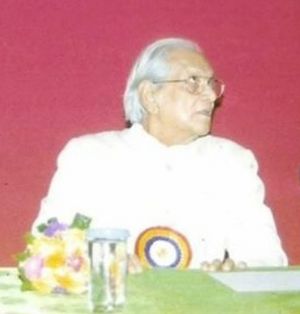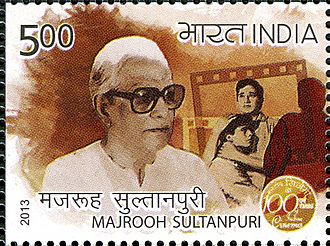Majrooh Sultanpuri facts for kids
Quick facts for kids
Majrooh Sultanpuri
|
|
|---|---|
 |
|
| Background information | |
| Birth name | Asrar ul Hassan Khan |
| Born | 1 October 1919 Sultanpur, United Provinces of Agra and Oudh, British India |
| Died | 24 May 2000 (aged 80) Mumbai, Maharashtra, India |
| Occupation(s) | poet, lyricist, film songwriter |
| Years active | 1946–2000 |
Asrar ul Hassan Khan (born October 1, 1919 – died May 24, 2000), known as Majrooh Sultanpuri, was a famous Indian Urdu poet and lyricist. He wrote many songs for Hindi language films in India. His words were used in countless Hindi film soundtracks.
Majrooh Sultanpuri was a very important person in Indian cinema during the 1950s and early 1960s. He was also a key part of the Progressive Writers' Movement, which was a group of writers who wanted to bring about social change through their work. Many people consider him one of the best Urdu poets of the 20th century.
He worked for over sixty years in the film industry. He won the Filmfare Best Lyricist Award in 1965 for his song "Chahunga Main Tujhe" from the movie Dosti. In 1993, he received the Dadasaheb Phalke Award, which is the highest honor in Indian cinema. In the 1980s and 1990s, he often worked with music directors Anand–Milind. Some of their famous movies together include Qayamat Se Qayamat Tak, Lal Dupatta Malmal Ka, and Love.
He also wrote classic songs with Jatin-Lalit for films like Jo Jeeta Wohi Sikander. This included the popular song “Pehla Nasha.” Another hit was “Bin Tere Sanam” from their first film, Yaara Dildara. These songs are still enjoyed by many people today.
Contents
His Early Life and Journey to Poetry
Majrooh Sultanpuri was born as Asrar ul Hassan Khan in 1919 in Sultanpur, Uttar Pradesh. His family was Muslim. His father was a police officer but wanted his son to have a traditional education. So, Majrooh studied at a 'Madrasa', where he learned about religious topics, Arabic, and Persian.
After that, he studied Unani medicine, which is an ancient Greek system of medicine. He was trying to start his medical practice when he shared one of his poems, called a ghazal, at a poetry gathering in Sultanpur. The audience loved his poem! This made Majrooh decide to stop practicing medicine and focus on writing poetry.
Soon, he became well-known at poetry gatherings. He also became a student of Jigar Moradabadi, who was a very famous Urdu poet at that time. Even though Majrooh is famous for his film songs, he also wrote some of the most beautiful Urdu poetry. One of his famous lines means: "I started alone towards my goal, but people joined in, and soon it became a caravan!"
Writing for Films: A New Chapter
In 1945, Majrooh visited Bombay for a poetry event. His poems were greatly admired there. A film producer named A.R. Kardar was impressed. He asked Jigar Moradabadi to help him meet Majrooh. At first, Majrooh didn't want to write for films because he didn't think highly of them.
But Jigar Moradabadi convinced him, saying that films would pay well and help him support his family. Kardar then introduced him to music composer Naushad. Naushad tested Majrooh by giving him a tune and asking him to write lyrics for it. Majrooh wrote "Jab Usne Gesu Bikhraye, Badal Aaye Jhoom Ke." Naushad loved it!
Majrooh was then hired to write songs for the film Shah Jehan (1946). The songs from this movie became incredibly popular. The famous singer K.L. Saigal even wanted one of the songs, "Jab Dil Hi Toot Gaya," to be played at his funeral.
Early Success in Bollywood
After Shah Jehan, Majrooh worked on other films like Naatak (1947) and Doli (1947). His big break came with Mehboob Khan’s famous love story, Andaz (1949). He wrote many hit songs for this film, including "Tu Kahe Agar" and "Jhoom Jhoom Ke Naacho Aaj."
Another film where his songs were very popular was Arzoo (1950), starring Dilip Kumar. The song "Ae Dil Mujhe Aisi Jagah Le Chal" from this movie is still considered one of the best songs featuring Dilip Kumar.
Facing Challenges and Making a Comeback
In 1949, Majrooh faced a difficult time. He was sent to prison for two years because of his poems that spoke out against the government. He was arrested along with other writers who shared similar political views. The government asked him to apologize, but he refused.
While he was in prison, his family faced money problems. Raj Kapoor helped him by asking him to write a song, "Ek Din Bik Jayega Maati Ke Mol," for his 1975 film Dharam Karam, and paid him for it.
After his release, Majrooh had to restart his film career. He made a strong comeback with Guru Dutt’s films Baaz (1953) and especially Aar Paar (1954). With hit songs like "Babuji Dheere Chalna" and "Yeh Lo Main Haari Piya," Majrooh was back in demand. From then on, he never had to struggle again.
The team of Guru Dutt, Majrooh Sultanpuri, and O. P. Nayyar created even more magic with Dutt’s next film, Mr. & Mrs. '55 (1955). Songs like "Thandi Hawa Kaali Ghata" and "Jaane Kahan Mera Jigar Gaya Ji" were very popular across the country.
Working with Top Music Directors
Majrooh Sultanpuri worked with almost all the top music directors of his time. These included Anil Biswas, Naushad, Madan Mohan, O. P. Nayyar, Roshan, Salil Chowdhury, Kalyanji-Anandji, and Laxmikant-Pyarelal. His work with S.D. Burman was especially memorable, leading to many amazing songs.
His Important Collaborations
Majrooh Sultanpuri had special partnerships with several music directors, creating some of Bollywood's most loved songs.
Working with S.D. Burman
With S.D. Burman, Majrooh wrote unforgettable songs for films like Paying Guest (1957), Nau Do Gyarah (1957), Kala Pani (1958), Sujata (1959), and Jewel Thief (1967). These films had many beautifully composed songs.
Majrooh and S.D. Burman were excellent at creating light, playful, and romantic songs like "Chhod Do Aanchal" (from Paying Guest) and "Achha Ji Main Haari Chalo Maan Jaao Na" (from Kala Pani). But they could also create deep and serious songs, such as "Chand Phir Nikla" (from Paying Guest) and "Hum Bekhudi Mein Tumko Pukare" (from Kala Pani).
Working with R.D. Burman
Majrooh worked on many films with R.D. Burman. Their work together was especially famous in the fun musicals produced by Nasir Hussain in the 1960s, 70s, and early 80s. Films like Teesri Manzil (1966), Caravan (1971), and Yaadon Ki Baaraat (1973) are great examples.
Working with Laxmikant-Pyarelal
In 1964, Majrooh Sultanpuri started working with the music duo Laxmikant-Pyarelal on the film Dosti. Majrooh’s lyrics for this film won him his only Filmfare award. Laxmikant–Pyarelal also won their first Filmfare award for the music of Dosti.
Majrooh Sultanpuri and Laxmikant-Pyarelal worked on almost 40 films together. They created many wonderful albums, including Dillagi (1966), Pathar Ke Sanam (1967), and Shagird (1967). Some of their hit songs include "Chahunga Main Tujhe" (from Dosti), "Bade Miyan Deewane" (from Shagird), and "Patthar Ke Sanam" (from Patthar Ke Sanam).
He continued to write youthful songs even for the next generation of filmmakers. He wrote for Nasir Hussain’s son, Mansoor Khan, in films like Qayamat Se Qayamat Tak (1988) and Jo Jeeta Wohi Sikander (1992). One of the last films he wrote for was One 2 Ka 4, starring Shah Rukh Khan, which was released after Majrooh Sultanpuri passed away in 2001.
Speaking Out for What He Believed In
Majrooh Sultanpuri was a strong believer in social justice. His political views sometimes caused him trouble. In 1949, he was arrested and jailed for two years because of his poems that criticized the government. He was asked to apologize, but he refused.
This happened during a time when many people who wanted big changes in India were being arrested. Majrooh chose to stand by his beliefs, even though it meant hardship for him and his family. His commitment to his ideals was a big part of who he was.
Awards and Special Recognitions
Majrooh continued to write popular film lyrics throughout the 1950s and beyond. He was considered one of the most important ghazal writers of his time. He won his only Filmfare Best Lyricist Award for the song "Chahunga Mein Tujhe Saanj Savere" from the film Dosti.
In 1993, he was honored with the Dadasaheb Phalke Award. He was the first lyricist ever to receive this very special award, which celebrates lifetime achievement in Indian cinema.
His Important Work with Nasir Hussain
Majrooh and film director Nasir Hussain worked together on many successful films. Their first collaboration was the 1957 film Paying Guest, which Nasir wrote. After Nasir became a director and producer, they continued to create many big hits together. These films include some of Majrooh's most famous works:
- Tumsa Nahin Dekha (1957)
- Teesri Manzil (1966)
- Caravan (1971), which has the famous song "Piya Tu Ab To Aaja"
- Yaadon Ki Baraat (1973)
- Qayamat Se Qayamat Tak (1988)
- Jo Jeeta Wohi Sikander (1992)
Majrooh also played a part in introducing R.D. Burman to Nasir Hussain for the film Teesri Manzil. This trio worked together on many successful films for years.
His Legacy and Passing
Majrooh Sultanpuri passed away in Mumbai on May 24, 2000, at the age of 80, after an illness. To honor his memory, the Municipal Corporation of Sultanpur built a garden called "Majrooh Sultanpuri Udyaan." His son, Andaleb Sultanpuri, directed the 1999 film Jaanam Samjha Karo. Majrooh Sultanpuri's words and songs continue to be loved and remembered by many.
 | Kyle Baker |
 | Joseph Yoakum |
 | Laura Wheeler Waring |
 | Henry Ossawa Tanner |


